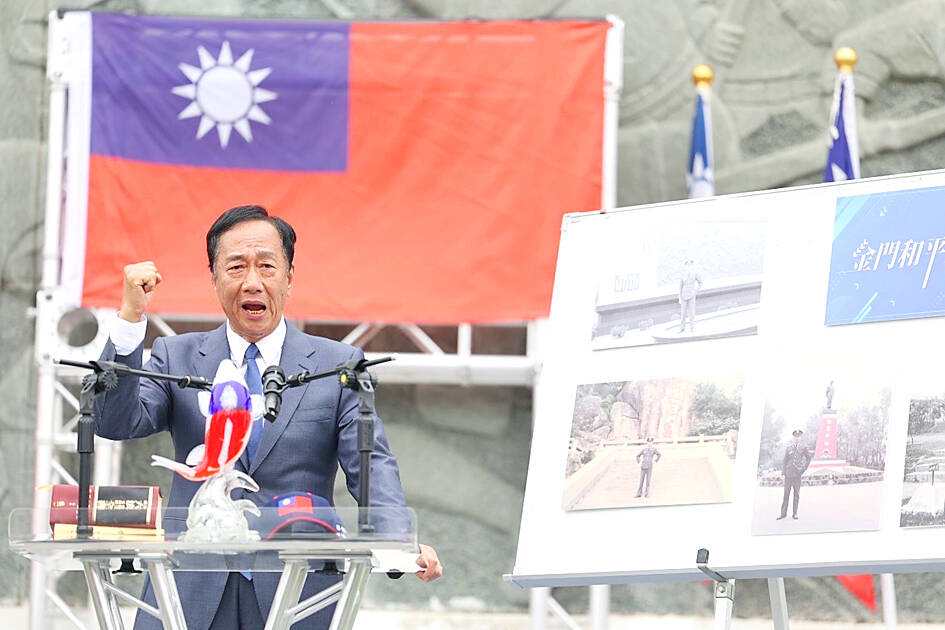Hon Hai Precision Industry Co founder Terry Gou (郭台銘) yesterday said he would restart negotiations with Beijing on the basis of “one China, with different interpretations” that reaffirm the foundations and stance of the Republic of China (ROC) if elected president next year.
Gou, who is vying for the Chinese Nationalist Party (KMT) presidential nomination, said he would use Kinmen as the location for negotiations.
Gou made the remark during a visit to Kinmen yesterday, in what he called a “peace declaration.”

Photo courtesy of Gou’s office via CNA
It is the People’s Republic of China (PRC) that says: “We are all Chinese” and “Both sides are one big family,” Gou said.
The PRC demonstrates hostility with its military exercises, he said.
However, Beijing’s actions are not targeting Taiwanese, but when they do, they are reactions to provocations by the ruling Democratic Progressive Party (DPP).
The “1992 consensus” states that there is one China, with each side of the Taiwan Strait having its own interpretation of what “China” means,” but “one China” and “each side having its own interpretation” are equally important, he said.
The so-called “1992 consensus,” a term former Mainland Affairs Council chairman Su Chi (蘇起) in 2006 admitted making up in 2000, refers to a tacit understanding between the KMT and the Chinese government that both sides of the Strait acknowledge there is “one China,” with each side having its own interpretation of what “China” means. The DPP has never acknowledged the existence of the “1992 consensus” or “one China” consensus.
The consensus is the foundation for cross-strait talks, which were ongoing over the past two decades, but have ceased since relations regressed and both sides are preparing for war, Gou said.
This is because the DPP has made subtle changes to the consensus, saying that there are “two Chinas,” or “one China, one Taiwan,” or “one country on each side,” he added.
While spreading these slogans, the DPP has created discord among different ethnicities and torn Taiwan apart, he said.
The ROC and what it stands for must remain strong, a conviction that would assuage Beijing that Taiwanese independence is a non issue, removing the need for military harassment and affording both sides the time they need to hash out respective definitions of “China,” Gou said.
In response to Gou’s allegations that the DPP is provoking China with its policies, the Mainland Affairs Council yesterday said that the government has stood by principles of non-provocation and non-capitulation for the past seven years.
Taiwan would not tolerate any statement that Beijing makes under the threat of force, it said.

The Ministry of Education (MOE) is to launch a new program to encourage international students to stay in Taiwan and explore job opportunities here after graduation, Deputy Minister of Education Yeh Ping-cheng (葉丙成) said on Friday. The government would provide full scholarships for international students to further their studies for two years in Taiwan, so those who want to pursue a master’s degree can consider applying for the program, he said. The fields included are science, technology, engineering, mathematics, semiconductors and finance, Yeh added. The program, called “Intense 2+2,” would also assist international students who completed the two years of further studies in

The brilliant blue waters, thick foliage and bucolic atmosphere on this seemingly idyllic archipelago deep in the Pacific Ocean belie the key role it now plays in a titanic geopolitical struggle. Palau is again on the front line as China, and the US and its allies prepare their forces in an intensifying contest for control over the Asia-Pacific region. The democratic nation of just 17,000 people hosts US-controlled airstrips and soon-to-be-completed radar installations that the US military describes as “critical” to monitoring vast swathes of water and airspace. It is also a key piece of the second island chain, a string of

Taiwan will now have four additional national holidays after the Legislative Yuan passed an amendment today, which also made Labor Day a national holiday for all sectors. The Chinese Nationalist Party (KMT) and Taiwan People’s Party (TPP) used their majority in the Legislative Yuan to pass the amendment to the Act on Implementing Memorial Days and State Holidays (紀念日及節日實施辦法), which the parties jointly proposed, in its third and final reading today. The legislature passed the bill to amend the act, which is currently enforced administratively, raising it to the legal level. The new legislation recognizes Confucius’ birthday on Sept. 28, the

A magnitude 5.9 earthquake that struck about 33km off the coast of Hualien City was the "main shock" in a series of quakes in the area, with aftershocks expected over the next three days, the Central Weather Administration (CWA) said yesterday. Prior to the magnitude 5.9 quake shaking most of Taiwan at 6:53pm yesterday, six other earthquakes stronger than a magnitude of 4, starting with a magnitude 5.5 quake at 6:09pm, occurred in the area. CWA Seismological Center Director Wu Chien-fu (吳健富) confirmed that the quakes were all part of the same series and that the magnitude 5.5 temblor was